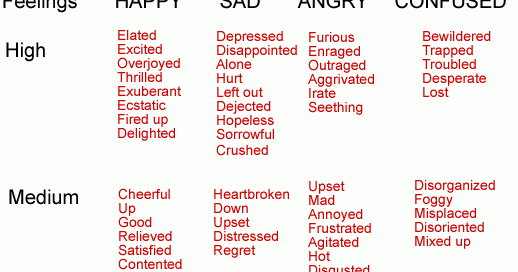


Confidence – emotion involving a strong sense of self-esteem and belief in yourself can be specific to a situation or activity, or more universal.Surprise (the good kind!) – a sense of delight when someone brings you unexpected happiness or a situation goes even better than you had hoped.Cheerfulness – a feeling of brightness, being upbeat and noticeably happy or chipper feeling like everything is going your way.Affection – an emotional attachment to someone or something, accompanied by a liking for them and a sense of pleasure in their company.Relief – the feeling of happiness you experience when an uncertain situation turns out for the best, or a negative outcome is avoided.Satisfaction – a sense of pleasure and contentment you get from accomplishing something or fulfilling a need.Altruism – usually referred to as an act of selflessness and generosity towards others, but can also describe the feeling you get from helping others.Elevation – the feeling you get when you see someone engaging in an act of kindness, generosity, or inner goodness, spurring you to aspire to similar action.Awe – an emotion that is evoked when you witness something grand, spectacular, or breathtaking, sparking a sense of overwhelming appreciation.Inspiration – feeling engaged, uplifted, and motivated by something you witnessed.Amusement – a feeling of lighthearted pleasure and enjoyment, often accompanied by smiles and easy laughter.Pride – a sense of approval of oneself and pleasure in an achievement, skill, or personal attribute.Hope – a feeling of optimism and anticipation about a positive future.Interest – a feeling of curiosity or fascination that demands and captures your attention.Serenity – a calm and peaceful feeling of acceptance of oneself.Gratitude – a feeling of thankfulness, for something specific or simply all-encompassing, often accompanied by humility and even reverence.Joy – a sense of elation, happiness, and perhaps even exhilaration, often experienced as a sudden spike due to something good happening.Not all of these words refer to emotions as scholars understand them, but they are the words most often used by people in describing their own emotions, which gives us a good foundation for positive emotions as they are commonly experienced. The list of positive emotions that people experience is nearly endless. Let’s dive right into Point A: which emotions are positive.

Whichever definition you think fits best, the most important things we need to know about them are (a) which emotions they are, (b) what is their purpose or point, (c) how we can improve our experience of them, either in quantity or quality, and (d) what effects they have on us. They have been defined as “multicomponent response tendencies” that last a short period of time (Fredrickson, 2001), aligning roughly with the second view, and as mental experiences that are both intense and pleasurable (Cabanac, 2002), adhering more closely to the first view. Narrowing down to positive emotions, there are two popular ways of defining them that loosely correspond to the two camps noted above. The implications of embracing one view over the other are fascinating, but for the purposes of understanding positive emotions and their role in psychology, it’s not necessary to choose between the two camps whether we can consciously choose our positive emotions or whether they are a direct result of some action or experience, it is mainly their effects that are of interest to the positive psychology practitioner. Most current scholars fall into the second camp, viewing emotions as the outcome or result of something, provoked by action, or by being on the receiving end of an action. Emotions are attitudes or responses to a situation or an object, like judgments (Zemach, 2001).Emotions are a state or feeling that cannot be conjured up at will, or.There are many ways to define “emotion,” but they generally fall into one of two camps: Positive emotions are not simply “happy feelings” that we chase to feel momentary pleasure like the more negative emotions, they play a significant role in everyday life. How Positive Emotions Can Improve the Workplaceīefore diving too deep into positive emotions, we should start by making sure we’re all on the same page about emotions-and positive emotions in particular.How Positive Emotions Foster Resilience and Improve Memory.The Health Benefits of Positive Emotions.A Short Summary of Fredrickson’s Broaden-and-Build Theory.The Role of Positive Emotions in Psychology.Why do We Need Positive Emotions? What Good are They?.What are Positive Emotions? A Definition.


 0 kommentar(er)
0 kommentar(er)
